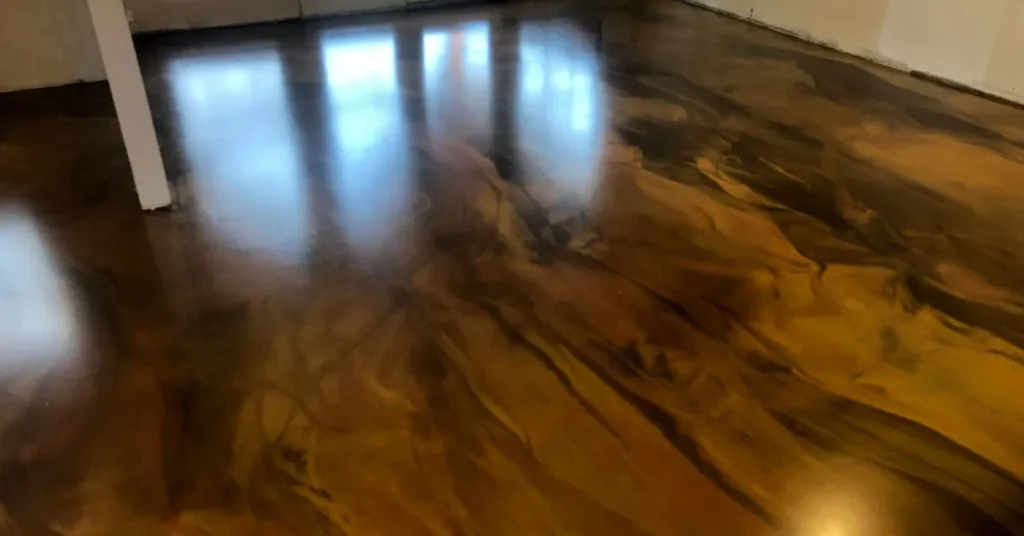Find All The Info On
Epoxy Flooring
Epoxy Flooring Overview
- Epoxy Flooring Home
- Epoxy Flooring Pictures
Popular Patterns:
Using metallic pigments, decorative flakes, dual-color schemes, and other popular patterns.
Color Options:
Coloring choices for epoxy flooring.
- Epoxy Flooring Design Ideas
Epoxy Flooring Applications
- Garage Floor Epoxy
- Commercial Epoxy Flooring
- Industrial Epoxy Flooring
- Basement Epoxy Flooring
- Residential Epoxy Flooring
Price and Performance
- Epoxy Flooring Costs
- Benefits of Epoxy Flooring
- Installation Process
- Epoxy Flooring Maintenance
Comparing Epoxy Flooring:
The pros and cons of installing epoxy floors.
Related Information
- Epoxy Floor Coatings
- Epoxy Products
- 3D Epoxy Graphics
- Design Ideas
- Epoxy Flooring Info
Website Sponsors And
Working Partners
If you’re looking for a new concrete floor coating, you’ll find custom epoxy design ideas here.








Let Us Find You A Professional
Concrator For Your Project
View All Contractors
Useful Resources
- How to Hire a Contractor?
- State License Requirements?
- Better Business Bureau?
We Have Gathered All The Information For Epoxy Flooring
Everything About Epoxy Flooring
By covering concrete flooring with durable epoxy coating, you can have an aesthetically pleasing floor that can last 20 years or more and is cost-efficient.
Epoxy is a unique variety of floor coating that is particularly durable and resistant to stains and chemicals. It’s a mix of resin and hardener that is poured over a prepared concrete surface. Once poured, it hardens and becomes an attractive and sturdy floor that is common for hospitals, schools, garages, and more.
Popular Resources
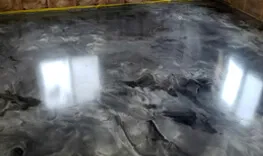
Epoxy Flooring Pictures
Browse a wide variety of photos that show the different colors, patterns, textures, and styles of epoxy flooring.
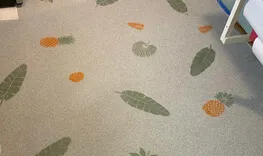
Epoxy Flooring Patterns
Here you can see the different types of patterns that can be applied using epoxy.
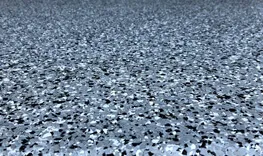
Epoxy Flooring Colors
The color options for epoxy offer a wide variety including solid colors, metallics, and dual-color schemes.
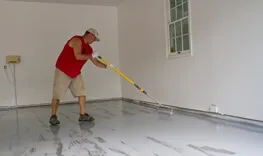
Epoxy Flooring Installation
Here you can learn all about what the process of installing epoxy flooring over concrete entails.
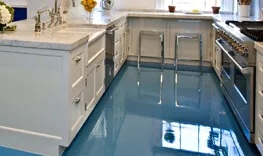
Epoxy Flooring Cost
How much does it cost to install epoxy? Find out initial pricing and what factors can raise or lower this cost.
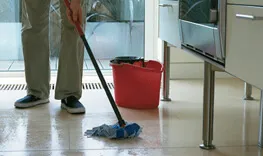
Epoxy Flooring Maintenance
How do you make epoxy floors last? Here we cover all the requirements of properly maintaining epoxy floors.
As epoxy is USDA approved, these floors are ideal for sensitive commercial settings that need to be sanitized on a regular basis, such as hospitals and restaurants. The seamless application is what makes it so easy to clean.
Take a look at these links for ideas, examples, and tips.
Stamped Patios | Stamped Pool Decks | Stamped Driveways
Contemplating Epoxy Flooring?
Is Epoxy Flooring Right For You?
Almost every type of flooring has some advantages and disadvantages. Epoxy floors can be an excellent choice for a variety of settings. However, analyzing both the pros and cons of epoxy is a helpful idea if you’re thinking about installing it in your home or business.

Epoxy Flooring Pros
- Epoxy coatings can last 20 years or more when properly installed and maintained.
- Epoxy is highly resistant to most chemicals, stains, and abrasions.
- Epoxy flooring affords complete customization with a wide variety of colors, patterns, and textures.
- Compared to other floors, epoxy can provide a brighter, more professional appearance.
- Due to its reflective nature, and when using textures, epoxy can be safer by enhancing vision and slip-resistance.
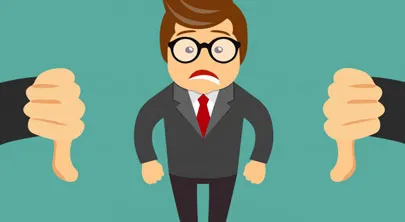
Epoxy Flooring Cons
- Epoxy can be difficult to install and may require professional assistance.
- If not installed exactly to specifications, it may not adhere properly and need to be replaced.
- The application process takes a few days to complete, making installation time-consuming endeavor.
- If the possibility of changing floors in the near future exists, epoxy is difficult and costly to remove.
- If you’re not using textured epoxy, it can become slippery when exposed to spills.
Consider all the pros and cons of epoxy coating to decide if this flooring is right for your home or business. Continue reading to learn more about the installation process and details of epoxy flooring.
Epoxy Flooring Installation
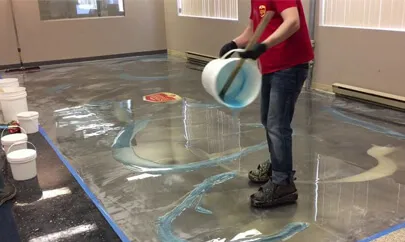
After the concrete has been profiled, cleaning, inspection, and a moisture check are completed prior to the application. When inspection and cleaning are completed, the epoxy can be applied. First, a coat of epoxy primer is applied to ensure adhesion. While the primer is drying, the epoxy resin is mixed with a urethane hardener. There is a time limit on each application of epoxy, so there is normally more than one person needed to install the epoxy flooring. A base coat is needed before customization can begin. After the base, the metallic pigments, flakes or logos are mixed in or set, respectively. After the epoxy has dried for a few hours, the topcoat is applied as a sealer for the floor. After it has cured for 72 hours, the epoxy floor is ready for use!
Examples of The
Types and Styles of Epoxy Flooring
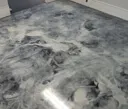
Metallic Epoxy
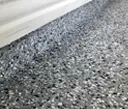
Decorative Flake Epoxy
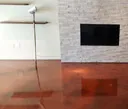
Colored Epoxy
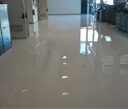
100% Solids Epoxy
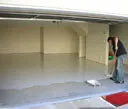
Solvent-Based Epoxy
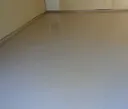
Water-Based Epoxy
Epoxy Flooring Maintenance
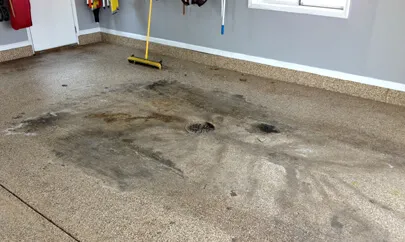
Spot clean your floors anytime a spill occurs or grime has been tracked in. Some stains, such as rust, need to be lightly scrubbed with a moderately abrasive scrubbing sponge or a soft brush and warm water. Avoid using steel wool or harsh chemicals as they are too abrasive. Wipe up antifreeze, oil and other car-related chemicals with shop towels or a paper towel and dispose of properly as they can damage the surface of the epoxy floor. Paint, household cleaners and other abrasive liquids need to be cleaned up immediately with towels as well.
If your floor becomes heavily soiled, sweep and vacuum the whole floor thoroughly. Once you have cleaned up all the surface dirt, grime, and grit, use a hard foam mop and warm water to remove all the built-up dirt. After that, you can use clear ammonia and water. Mix two to three ounces of ammonia per gallon of hot water for a second mopping.
Here Are The
Benefits of Epoxy Flooring
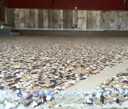
Durability
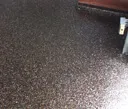
Seamless Surface

Lifespan
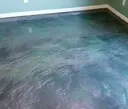
Protective Coating

Little Maintenance
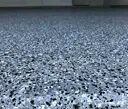
Customization
Frequently Asked
Questions & Answers
How long does it take to install an epoxy floor?
How much does it cost to install an epoxy floor?
Can you recoat epoxy floors?
Gallery For Design Ideas
Epoxy Flooring

Counter Tops
Pictures, construction info & design ideas for counters

Stained Concrete
Colors, photos and application techniques for staining.

Stamped Concrete
Patterns, designs, & installation info imprinting concrete.

Floors
Photos and info about the benefits of concrete flooring.

Concrete Information
Concrete & Cement Defined, Concrete Repairing.

Patio
Information and photos of concrete patios and more.
Start Projects
How To
Let Us Help You!
If you’re planning for new concrete or you’re rejuvenating an existing surface, you’ll find custom concrete ideas throughout the pages of The Concrete Network. Nowhere else on the Web can you access such a vast library of data including original articles, reports, guides, catalogs, photos of designs, and ideas for applications.

